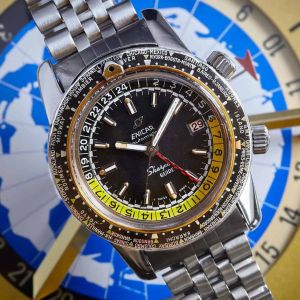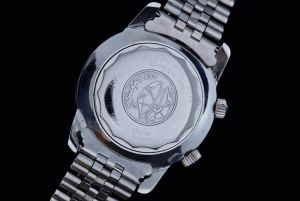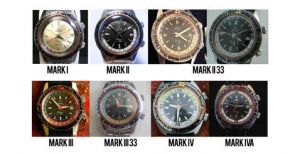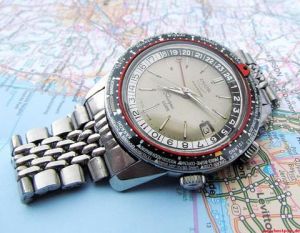Enicar Sherpa Guide

Sherpa Guide
The Sherpa line from Enicar was introduced in November of 1956, after an Enicar was used in a summit of Mount Everest; henceforth, all of its explorer or tool watches bore the Sherpa moniker. With a Sherpa Date, a Sherpa Diver, a Sherpa GMT, and Sherpa World Timer all having at one point been in production, it seems logical that Enicar sought to combine all these functions into one impressive tool watch. Largely black, with the yellow portion of the GMT track meant to indicate day, white accents on the bezel and the dial, and the interesting addition of a rally-style GMT hand, this watch was clearly intended to be highly legible.

Model Development

The first Guide models came to the market in the early 1960s. They came in a dark and a cream dial version. The Guide was probably the top model of an entire Pilot watch or Fliegeruhr model range (initially Stewardess, Steward, GMT, Guide, and later Jet, Super Jet, Jet Graph / Pilote). Essential features of these early versions were: Dauphine hands, crescent moon 24h pointer shape, stepped index markers, and thin crowns.
THE MARK I GUIDE

The larger size of the Enicar Sherpa Guide allows for a wider bezel, with fewer cities and division markings inside the city names. There is now a black and white internal rotating 24 hour bezel as well. The hands are still Dauphine style, but the feature is a half moon style 24h hand.
Features
- Model: Sherpa Guide 600
- Reference: 146-35-01
- Year: 1960s
- Material: Stainless steel. screw back (bayonet), signed Saturn crowns
- Dimensions: 43mm diameter; 14mm thickness
- Crystal: Acrylic
- Lume: Tritium
- Caliber: Enicar automatic caliber 166 with date and 24-hour function
- Bracelet/Strap: Double-signed Enicar stainless-steel bracelet
- Lug Width: 22mm
Notable Models
- Enicar Sea Pearl 600
- Enicar Sherpa Diver 600
- Enicar Sherpa Dive
- Enicar Sherpa Guide
- Enicar Sherpa Jet
- Enicar Sherpa Graph
